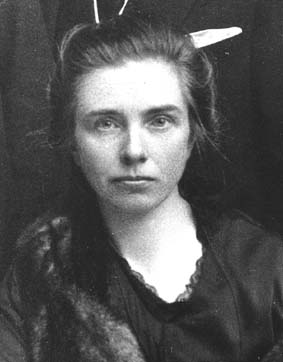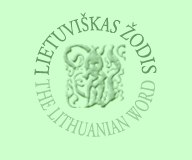 FELICIJA
BORTKEVICIENE, FELICIJA
BORTKEVICIENE,
(Povickaite; 1873-1945), prominent member of the Peasant
Populist Party, born on the estate of Linkaiciai, near Krekenava, county of
Panevezys, on September 1, 1873. Completing a girls' secondary school in
Vilnius in 1890, for one year she studied humanities at the Morawska Higher
School for Women in Warsaw. When the Tsarist regime closed the school, she
returned to Lithuania and worked at the Bank of Ukmerge. She married the
engineer Jonas Bortkevicius in 1899 and settled in Vilnius. During the
period of the ban on the Lithuanian press, she did administrative work for
the periodicals Varpas (The Bell) and Ukininkas (The Farmer),
which were published in Lithuania Minor (East Prussia). After the Russians
repealed the press ban in 1904, she was one of the founders and publishers
of the periodicals Lietuvos Ukininkas (The Lithuanian Farmer),
1905-1915, 1918-1940 and Lietuvos zinios (Lithuanian News),
1909-1915, 1922-1940; for a long time she was also the editor of these
publications. She founded the Varpas corporation (1920-1940) to
publish periodicals and books and was chairman of the board of directors
throughout the corporation's existence. Another area of her activities was
charity work. One of the organizers of the clandestine Martyrs' Fund (Kankiniu
Kasa), she directed the distribution of aid to Lithuanians, who suffered
imprisonment or other hardships in consequence of Russian repression before
World War I. In Russia during the war years of 1915-1918, she founded the
Aid Society (Globos Draugija), which helped those inhabitants of
Lithuania Minor whom the Russian army had removed from their native land and
resettled near the Volga and the Ural Mountains. For some 30 years she was
the chairman of Ziburelis (The Torch), an aid society for poor
secondary-school students, and worked with orphans as a member of the
Ladies' Aid Society (Moteru Globos Draugija) from 1919-1939.
Under the first Soviet government in Vilnius in 1919, Felicija Bortkeviciene
was arrested and imprisoned in Vilnius, Daugavpils, and Smolensk for six
months. Released in 1919, she settled in Kaunas. During the elections of
June 14-16, 1920, she was elected to the Constituent Assembly as a Peasant
Populist. She died in Kaunas on October 21, 1945, during the second Soviet
occupation, and is buried in Krekenava.
Literature:
ENCYCLOPEDIA LITUANICA I-VI, 1970-1978, Boston
|

